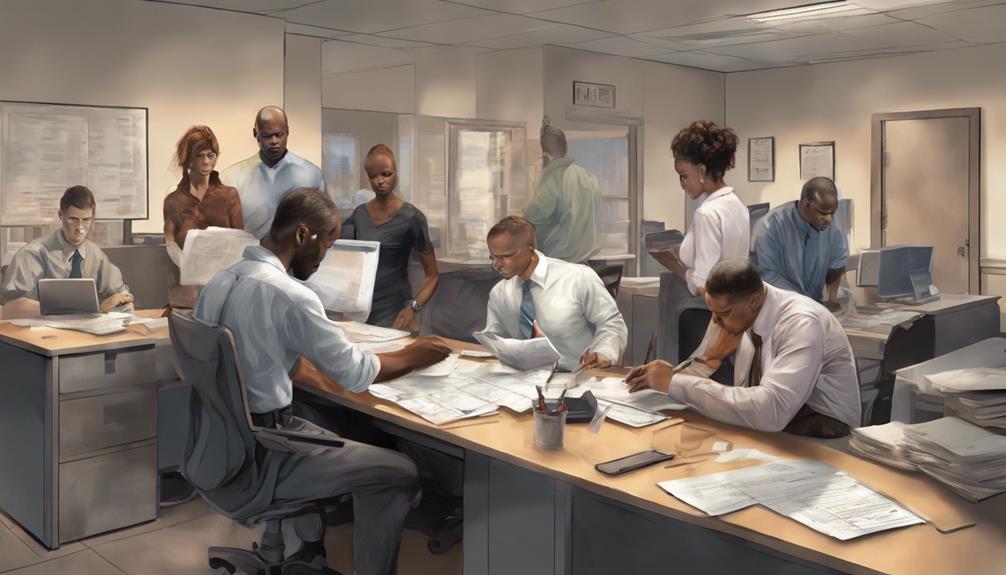Yes, workers' comp claims can appear on background checks. Employers may see details like dates of incidents and types of injuries. Legal protections forbid using this info for pre-employment screenings. Candidates focusing on job-related abilities during interviews is advised. Employers must request and candidates should truthfully share any previous claims. Rejecting solely on past claims may lead to legal actions. Seeking legal advice aids in understanding rights and handling inquiries confidently. Implications of workers' comp on job opportunities should be considered. It's essential to comprehend legal guidance regarding past claims and their impact on employability.
Key Takeaways
- Workers' comp claims typically do not show up on standard background checks.
- Specialized checks may reveal workers' comp history, but it's not common.
- Employers cannot use workers' comp history for pre-employment screening.
- Legal protections prevent discrimination based on past workers' comp claims.
- Workers' comp details may impact background checks post job offer.
Worker Compensation Background Check Overview

Worker compensation background checks offer a detailed insight into previous workers' compensation claims, detailing specific information such as injury type, affected body part, and time lost. These checks are vital for employers to assess a candidate's work history regarding injuries sustained on the job.
The ADA governs the process, ensuring that information from these checks can only be reviewed after a conditional job offer has been made. The background check report typically includes details such as the employer's name, date of incident, time lost, injury type, affected body part, and case disposition.
Data for these checks is sourced directly from state records, with a quick turnaround time of 1-2 days for the reports to be generated. It's essential for employers to understand and abide by ADA regulations, which prohibit discrimination against individuals with disabilities based on information obtained from worker compensation background checks.
Legal Protections for Workers' Comp Claims
Legal protections guarantee fair treatment for individuals with workers' comp claims. When it comes to workers' compensation claims, there are specific legal safeguards in place to guarantee that individuals aren't unfairly treated due to their past injuries.
Here are some key points to think about:
- Workers' comp claims can impact background checks after a conditional job offer is made.
- Background check details may include information such as the date of injury, affected body parts, and parties involved in the claim.
- Employers are prohibited from using workers' comp history as a basis for pre-employment screening.
- The Americans with Disabilities Act (ADA) prohibits discrimination against individuals based on their past workers' comp claims.
These legal protections are essential in safeguarding the rights of individuals who've made workers' comp claims, ensuring that they're treated fairly in the workplace without facing discrimination or unfair practices.
Impact of Workers Comp on Job Applications

The presence of workers' comp claims may influence job applications through the scrutiny of past injuries and their potential impact on job performance. While workers' comp claims may not directly appear on standard background checks, potential employers may gain access to this information after extending a conditional job offer.
Details such as the date of injury and the affected body parts could be disclosed during the background check process. However, using a history of workers' comp claims for pre-employment screening is typically discouraged due to legal protections in place.
Employers may inquire about past injuries and their implications for job performance during job application procedures, focusing on the ability of the candidate to fulfill the job requirements effectively. It's essential for individuals who've filed a workers' compensation claim or been involved in a personal injury case to be prepared to discuss these matters transparently during the hiring process to address any concerns employers may have regarding workplace injuries.
Addressing Medical History in Interviews
During interviews, employers should only inquire about an applicant's medical history if it directly impacts their ability to perform job duties.
It's important to focus on discussing job-related capabilities rather than past injuries to guarantee fair and unbiased hiring practices.
Being transparent about relevant medical history is vital for both the employer and the employee.
Medical History Disclosure
When addressing medical history in interviews, job seekers should focus on discussing job-related capabilities rather than personal medical history. It's essential to abide by privacy laws that protect employees from disclosing irrelevant medical information to employers.
During interviews, job applicants should emphasize their job-relevant skills and qualifications to potential employers rather than delving into personal medical details.
Here are some key points to bear in mind when it comes to medical history disclosure:
- Employers are prohibited from inquiring about medical history that doesn't impact job performance.
- Privacy laws safeguard employees from having to disclose medical information that's unrelated to the job.
- Job seekers should highlight their abilities and experiences that are directly relevant to the position.
- Focus on demonstrating how your skills align with the job requirements rather than discussing non-essential medical details.
Job Relevance Clarification
To ensure a focused discussion on job-relevant aspects, job seekers should center their responses around how their medical history directly influences their ability to perform the required tasks during interviews. Employers are within their rights to inquire about a candidate's medical history only if it pertains to job performance and job-related capabilities.
It's essential for job seekers to emphasize how their medical history aligns with the job duties and qualifications required for the position. Privacy laws also play a significant role in safeguarding employees from being questioned about medical information that's irrelevant to their job responsibilities.
During interviews, candidates should steer the conversation towards how their medical history positively impacts their ability to fulfill the required job duties effectively. By focusing on the job-related aspects of their medical history, candidates can demonstrate their suitability for the position while respecting privacy laws and maintaining the relevance of the discussion.
Disclosure of Past Claims by Employers

Employers evaluating job candidates may request information on previous workers' comp claims to assess their impact on job performance.
- Truthful Disclosure: Potential employers expect candidates to truthfully reveal any previous workers' compensation claims to evaluate job fit accurately.
- Written Information: Employers have the right to request documented details about past claims to make informed decisions during the hiring process.
- Legal Consequences: Rejecting a candidate solely based on a previous workers' comp claim can lead to potential legal repercussions for the employer.
- Job Fit Assessment: Understanding the impact of past claims on job performance helps employers determine if a candidate is appropriate for the role.
It's imperative for both employers and candidates to handle these discussions with transparency and honesty to guarantee a fair and lawful hiring process. Failure to disclose previous claims truthfully can't only affect the individual's future benefits but also impact their employment opportunities.
Importance of Legal Consultation
Legal consultation plays a crucial role in helping individuals understand their rights concerning workers' comp and background checks.
By seeking advice from a legal professional, individuals can gain valuable insights into how to address questions about workers' comp during the hiring process.
Consulting with legal experts is key to safeguarding rights and addressing potential issues related to past workers' comp claims.
Legal Guidance Importance
Seeking professional legal guidance is essential for individuals addressing questions about workers' comp claims during background checks. When it comes to dealing with the complexities of workers' comp information in the hiring process, legal consultation plays a pivotal role.
Here's why legal guidance is important:
- Understanding Legal Rights: Legal experts, such as Workers' Compensation Lawyers, can help individuals understand their rights and protections concerning workers' comp details.
- Advice on Disclosure: Specialized legal professionals can provide advice on how to disclose past injuries appropriately without compromising legal rights.
- Addressing Specific Concerns: Workers' comp lawyers offer consultations to address specific concerns and questions related to background checks.
- Handling Inquiries: Legal experts can assist in effectively handling inquiries about workers' comp claims during the hiring process, ensuring compliance with legal regulations and protection of rights.
Consultation Benefits
Understanding the benefits of legal consultation can empower individuals to address questions about past workers' comp claims confidently during job interviews. Seeking guidance from specialized workers' comp attorneys is vital in helping individuals tackle inquiries regarding past injuries on their employment background. These attorneys provide valuable insights on how to accurately disclose past injuries without compromising their rights.
By consulting with workers' comp lawyers, individuals can protect their interests and make well-informed decisions during job interviews. Additionally, workers' comp attorneys offer free consultations to discuss specific concerns and questions related to past claims. This legal consultation not only equips individuals with the necessary knowledge to handle job training and interviews effectively but also guarantees that they're well-prepared to address any inquiries regarding past workers' comp claims.
Ultimately, seeking legal advice can greatly benefit individuals in managing sensitive issues surrounding workers' comp claims during the job application process.
Protecting Your Rights
To safeguard their rights in relation to workers' compensation and background checks, individuals must prioritize obtaining legal consultation. Seeking guidance from legal professionals is pivotal in protecting one's rights and ensuring fair treatment in the face of past workers' comp claims.
Here are some key reasons why legal consultation is essential:
- Understanding Legal Rights: Legal consultation helps individuals understand their rights concerning workers' comp history and how it may impact job opportunities.
- Avoiding Discrimination: Lawyers can provide insights on how to prevent discrimination based on past workers' comp claims during job interviews.
- Navigating Job Interviews: Legal advice equips individuals with the knowledge to navigate inquiries about workers' comp during job interviews confidently.
- Maximizing Employment Opportunities: By being informed about their rights through legal consultation, individuals can make informed decisions that maximize their employment opportunities.
Through legal consultation, individuals can protect their rights, address potential discrimination, and approach job interviews with confidence.
Avoiding Discrimination in Hiring

Employers must make certain they don't discriminate against candidates based on their prior workers' comp claims when making hiring decisions. Discriminating against qualified individuals due to their workers' comp history is prohibited by the Americans with Disabilities Act.
Prospective employers should focus on evaluating candidates based on their skills and qualifications rather than their past injury claims. It's essential to assess all qualified individuals with disabilities for employment opportunities without letting their workers' comp history influence hiring decisions.
Failing to adhere to these guidelines can result in legal consequences for the employer. To navigate this aspect of hiring lawfully, employers may seek advice from workers' compensation attorneys to ensure compliance and fair treatment of all job applicants.
Candidates should highlight their abilities and qualifications during the job application process to demonstrate their suitability for the position without being overshadowed by their past workers' comp claims.
Frequently Asked Questions
Can You Ask About Workers' Comp Claims in an Interview?
Employers should not ask about workers' comp claims during job interviews. Instead, questions should focus on job duties and physical requirements. Discrimination based on past claims is prohibited. Emphasis remains on qualifications and job-related skills.
Does Workers' Comp Show on Background Check in California?
In California, workers' comp claims can appear on background checks post conditional job offers. Employers gain access to injury specifics like date, body parts affected, and involved parties. Reports may include injury type and time off details.
Are Workers' Comp Cases Public Record in California?
In the Golden State, workers' comp cases remain shielded from public view, safeguarding employees' confidentiality. Employers must seek proper authorization to access detailed information, respecting California laws that prioritize privacy rights.
Can Employers Check Workers' Comp History in Nsw?
Employers in NSW can check workers' comp history through the Workers Compensation Nominal Insurer. This information includes claims, employer details, and injuries. Access is regulated by privacy laws. It helps employers assess risk for hiring decisions.
Will Workers Comp Claims Affect My Background Check Results?
When it comes to background checks, many employers do not include workers comp claims in their assessments. However, some may look at your history, including any traffic violations on checks. It’s essential to be transparent about these issues and provide context during the hiring process.
Conclusion
To sum up, maneuvering workers' comp claims and background checks can be a challenging path to walk. With legal protections in place, job applicants should feel secure in their rights.
Remember, honesty is the best approach when discussing past medical history during interviews. Employers must also follow legal guidelines when reviewing past workers' comp claims.
When uncertain, seek legal advice to guarantee a fair and just hiring process. Just like a well-functioning machine, transparency and compliance keep the hiring process running smoothly.









